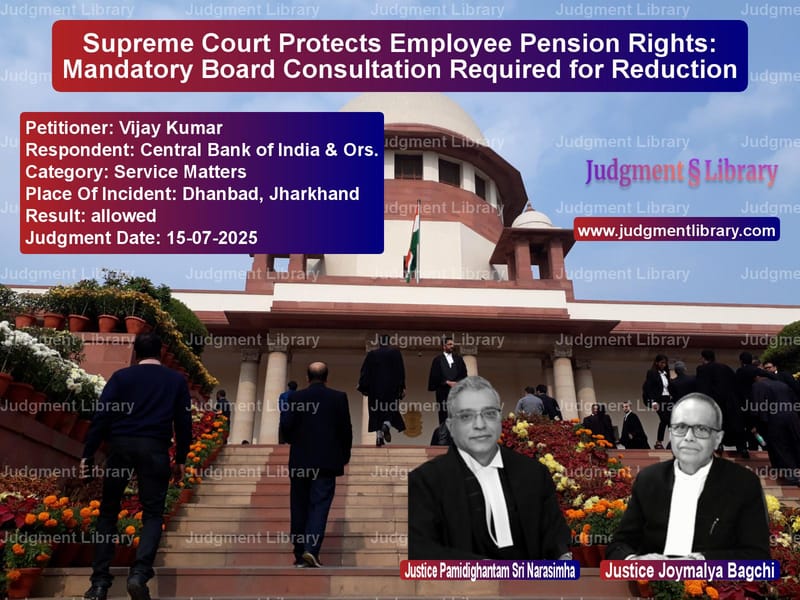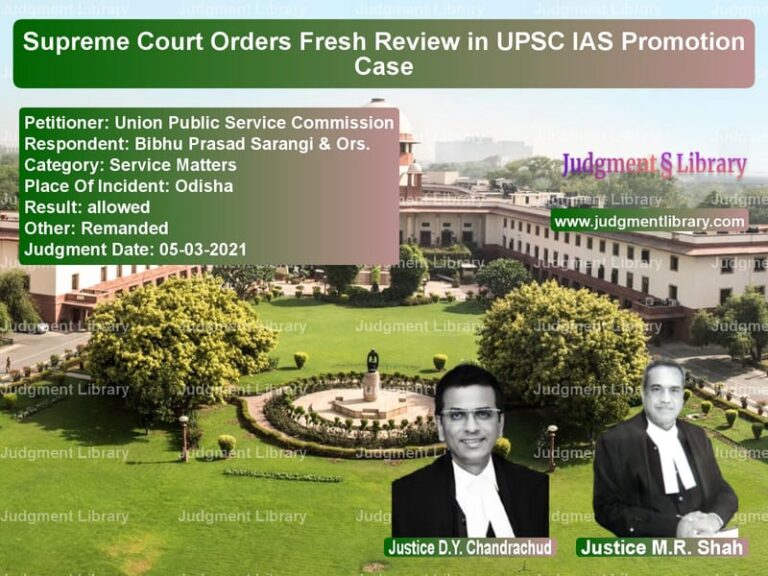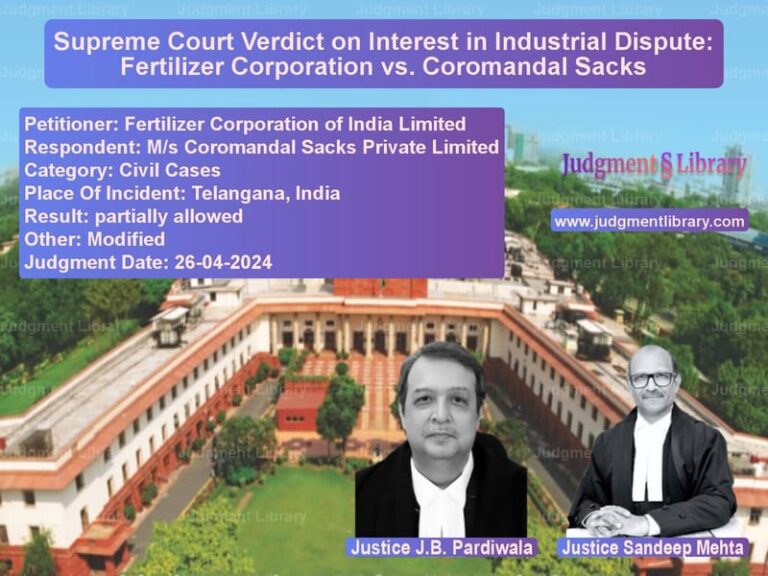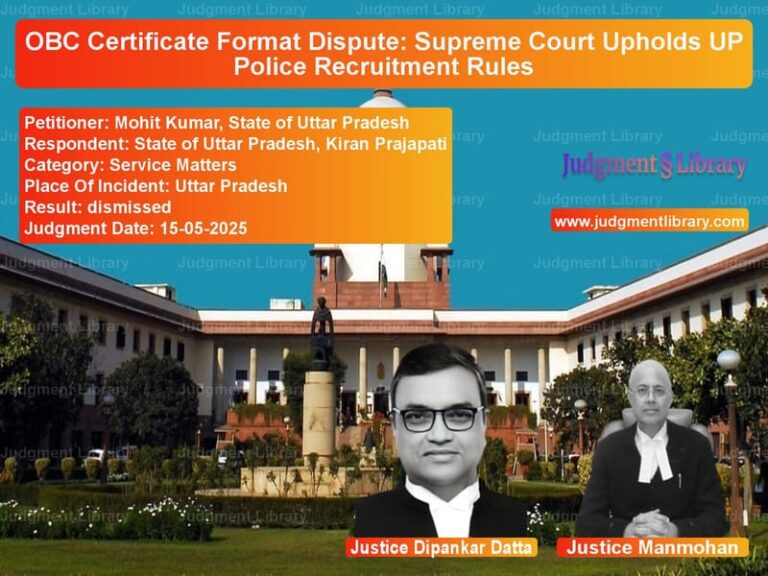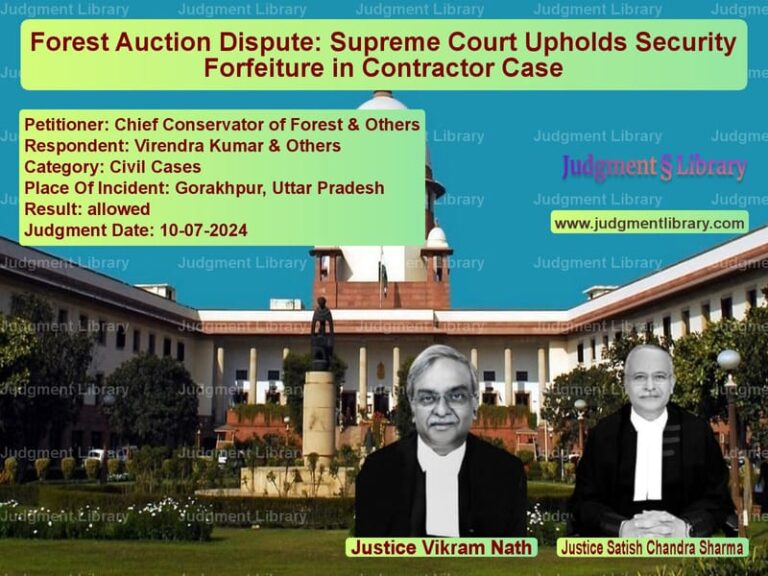Supreme Court Protects Employee Pension Rights: Mandatory Board Consultation Required for Reduction
In a significant ruling that reinforces the constitutional protection of pension rights, the Supreme Court of India has delivered a landmark judgment safeguarding employees from arbitrary reduction of their pension benefits. The case of Vijay Kumar versus Central Bank of India & Ors. revolves around a bank employee who faced a one-third cut in his pension following compulsory retirement, and the Court’s decision establishes crucial procedural safeguards that must be followed before any such reduction can be implemented.
The story begins with Vijay Kumar, who served as a Chief Manager, a Scale IV officer in the Central Bank of India. During his tenure as Branch Manager at the Dhanbad Branch, he was accused of sanctioning loans in respect of 12 accounts without proper appraisal of income, non-verification of KYC compliance, and without post-sanction inspection. These alleged lapses were said to have exposed the bank to potential financial loss of a huge amount, leading to disciplinary proceedings against him.
The bank appointed A.K. Roy, an Assistant General Manager (Scale V officer) as the Inquiry Authority. During the inquiry proceedings, Kumar attained superannuation on November 30, 2014, but the enquiry continued under Regulation 20(3)(iii) of the Central Bank of India (Officers’) Service Regulations, 1979. The inquiry report concluded that Kumar had ‘failed to discharge his duties with utmost integrity and honesty which was unbecoming of a Bank officer and exposed the Bank to huge financial loss for his pecuniary gain.’ After considering his reply to the inquiry report, the disciplinary authority – a Deputy General Manager (Scale VI officer) – upheld the findings and imposed the major penalty of compulsory retirement under Rule 4(h) of the Central Bank of India Officer Employees’ (Discipline and Appeal) Regulations, 1976, with effect from his date of superannuation.
While Kumar’s appeal was pending before the appellate authority (Field General Manager, a Scale VII officer), an interesting development occurred. The Regional Manager of Purnea, a Scale IV officer equivalent to Kumar’s scale, recommended on August 5, 2015, that Kumar be granted the minimum payable pension under compulsory retirement, i.e., two-third pension. The Field General Manager concurred with this recommendation on August 7, 2015, and recommended award of two-third compulsory retirement pension. However, on December 30, 2015, the same Field General Manager, acting as the appellate authority, dismissed Kumar’s appeal and upheld the penalty imposed on him.
Kumar initially approached the Patna High Court challenging the validity of Regulation 20(3)(iii) of the Service Regulations, which enabled the bank to continue disciplinary proceedings even after superannuation, and for setting aside the order of compulsory retirement including disbursal of full retiral benefits. However, he subsequently restricted his challenge only to the disbursal of full retiral benefits. During the hearing, the High Court was informed that while the bank had not passed any order forfeiting gratuity, it had taken a decision to award only two-third of the pension payable to Kumar. The High Court directed release of gratuity but upheld the bank’s decision to reduce one-third of Kumar’s pension.
Aggrieved by this reduction, Kumar approached the Supreme Court. His counsel, Mr. Neeraj Shekhar, made compelling arguments before the Court. He contended that ‘pension is not a bounty and appellant’s right to pension is constitutionally protected under Article 300A. Such right could not be taken away save and except by a clear prescription of law.’ He argued that the ‘High Court erred in holding that a compulsorily retired employee is not entitled to pension at all unless an order under regulation 33(1) of the Pension Regulations is passed.’ Shekhar further submitted that ‘Regulation 33 (1) and (2) must be harmoniously construed to mean in cases where penalty of compulsory retirement is imposed, such employee has a right to receive pension not less than two-third of the full pension and such deduction can be made only after prior consultation with the Board of Directors.’
On the other side, the bank’s counsel, Mr. Dhruv Mehta, learned Senior Counsel, presented a different interpretation. He submitted that ‘a plain reading of regulation 33 (1) and (2) would show the clauses are mutually exclusive and operate in different circumstances which do not overlap each other.’ He explained that ‘as per clause (1), an authority higher than the authority competent to impose compulsory retirement penalty may grant pension at a rate not less than two-third whereas clause (2) permits the competent authority awarding compulsory retirement to award less than full pension in exercise of its original, appellate or reviewing powers. Only in the latter case consultation with Board of Directors is necessary.’ Mehta argued that since ‘the pension was reduced by the Field General Manager, a scale VII officer who is an authority higher in rank than the disciplinary authority, a scale VI officer no prior consultation was necessary, and the impugned decision did not call for interference.’
The controversy centered around the interpretation of Regulation 33 of the Central Bank of India (Employees’) Pension Regulations, 1995, which provides for compulsory retirement pension. Clause (1) states that ‘an employee compulsorily retired from service as a penalty on or after 1st day of November, 1993 in terms of Central Bank of India Officer Employees’ (Discipline and Appeal) Regulations, 1976 or awards/settlements may be granted by the authority higher than the authority competent to impose such penalty, pension at a rate not less than two-thirds and not more than full pension admissible to him on the date of his compulsory retirement if otherwise he was entitled to such pension on superannuation on that date.’ Clause (2) mandates that ‘whenever in the case of a bank employee the Competent Authority passes an order (whether original, appellate or in exercise of power of review) awarding a pension less than the full compensation pension admissible under these regulations, the Board of Directors shall be consulted before such order is passed.’
The Supreme Court, in its analysis, found the bank’s argument ‘fallacious’ for several reasons. The Court explained that ‘Clause (2) permits the Competent Authority to award pension in exercise of not only original but also appellate or reviewing powers. If the expression ‘Competent Authority’ in clause (2) is restricted to disciplinary authority alone, reduction of pension in exercise of appellate or review power would become nugatory. Any interpretation which renders words or expressions in a statute otiose ought to be eschewed.’
The Court further observed that ‘given this situation to accept the bank’s interpretation that the two clauses ought to be read independent of one another would give rise to a piquant situation where the self-same authority, i.e., Field General Manager reducing pension under clause (1) would not require prior consultation with the Board which is mandatory while exercising similar power under clause (2). To avoid this anomaly whenever a superior authority reducing pension under regulation 33(1) is also appellate authority or reviewing authority who is empowered to exercise power under clause (2), the requirement of prior consultation with the Board must be held to be mandatory, failing which requirement of such prior consultation may be circumvented by the bank to the prejudice of the employee.’
In a powerful affirmation of pension rights, the Court stated: ‘There is no cavil that pension is not a discretion of the employer but a valuable right to property and can be denied only through authority of law. When an authority is vested with the discretion to grant pension less than full pension admissible under the Pension Regulations, all procedural safeguards in favour of the employee including prior consultation must be strictly followed.’
The Court also corrected the High Court’s misinterpretation of the word ‘may’ in Regulation 33(1). The Supreme Court clarified that ‘the word ‘may’ must be read in its proper context, that is to say, it was used in the regulation not to vest discretion in the superior authority to grant pension less than two-third of full pension payable but to clarify that the aforesaid clause will not entitle a compulsorily retired employee to pension if he is not otherwise entitled to such pension on superannuation on that day.’
The Court firmly established that ‘In fine, we hold clause (1) and clause (2) of regulation 33 must be read conjointly and in all cases when the full pension admissible to a compulsorily retired employee under the regulations is reduced, a prior consultation with the Board is necessary.’
Addressing the question of whether post-facto approval could substitute prior consultation, the Court was unequivocal: ‘A plain reading of regulation 33 would show award of pension less than full pension is to be done with prior consultation of the Board of Directors. Such prior consultation with the highest authority of the Bank i.e., Board of Directors must be understood as a valuable mandatory safeguard before an employee’s constitutional right to pension is curtailed. In these circumstances, a post facto approval cannot be a substitute of prior consultation with the Board before the decision is made.’
The Court relied on the parameters established in Indian Administrative Service (S.C.S.) Association, U.P. & Ors. vs. Union of India & Ors., which had elucidated that ‘Consultation is a process which requires meeting of minds between the parties involved in the process of consultation on the material facts and points involved to evolve a correct or at least satisfactory solution. There should be meeting of minds between the proposer and the persons to be consulted on the subject of consultation.’ The judgment further noted that ‘when the offending action affects fundamental rights or to effectuate built-in insulation, as fair procedure, consultation is mandatory and non-consultation renders the action ultra vires or invalid or void.’
The bank made a final attempt to salvage its position by requesting the Court to ‘invoke powers under Article 142 to do complete justice and endorse the decision of the reduction of pension in the present case.’ However, the Court rejected this plea, noting that ‘though it is claimed that the delinquent acts of the appellant had caused an approximate loss to the tune of Rs. 3.26 crores to the bank, no evidence relating to the computation of such loss was either considered by the disciplinary authority or by the appellate authority. Further, no opportunity of hearing was given by the authorities prior to reducing his pension. No exceptional case to exercise our extraordinary powers under Article 142 is made out.’
Accordingly, the Supreme Court allowed the appeal and set aside both the High Court’s order and the Field General Manager’s order dated August 7, 2015, which had reduced Kumar’s pension without prior consultation with the Board of Directors. The Court gave the bank the option to ‘take appropriate decision regarding reduction of pension after giving an opportunity of hearing to the appellant and with prior consultation of the Board within two months from the date of this judgment failing which the appellant shall be entitled to full pension from the date of superannuation.’
This judgment serves as a powerful reminder that pension is not a mere bounty or discretionary benefit but a constitutionally protected property right. It establishes that procedural safeguards, particularly prior consultation with the highest decision-making body, cannot be bypassed when making decisions that affect an employee’s fundamental right to pension. The ruling ensures that banks and other employers cannot arbitrarily reduce pension benefits without following due process and proper consultation, thereby protecting the financial security of retired employees who have dedicated their careers to public service.
Petitioner Name: Vijay Kumar.Respondent Name: Central Bank of India & Ors..Judgment By: Justice Pamidighantam Sri Narasimha, Justice Joymalya Bagchi.Place Of Incident: Dhanbad, Jharkhand.Judgment Date: 15-07-2025.Result: allowed.
Don’t miss out on the full details! Download the complete judgment in PDF format below and gain valuable insights instantly!
Download Judgment: vijay-kumar-vs-central-bank-of-indi-supreme-court-of-india-judgment-dated-15-07-2025.pdf
Directly Download Judgment: Directly download this Judgment
See all petitions in Pension and Gratuity
See all petitions in Employment Disputes
See all petitions in Disciplinary Proceedings
See all petitions in Termination Cases
See all petitions in Public Sector Employees
See all petitions in Judgment by P.S. Narasimha
See all petitions in Judgment by Joymalya Bagchi
See all petitions in allowed
See all petitions in supreme court of India judgments July 2025
See all petitions in 2025 judgments
See all posts in Service Matters Category
See all allowed petitions in Service Matters Category
See all Dismissed petitions in Service Matters Category
See all partially allowed petitions in Service Matters Category

